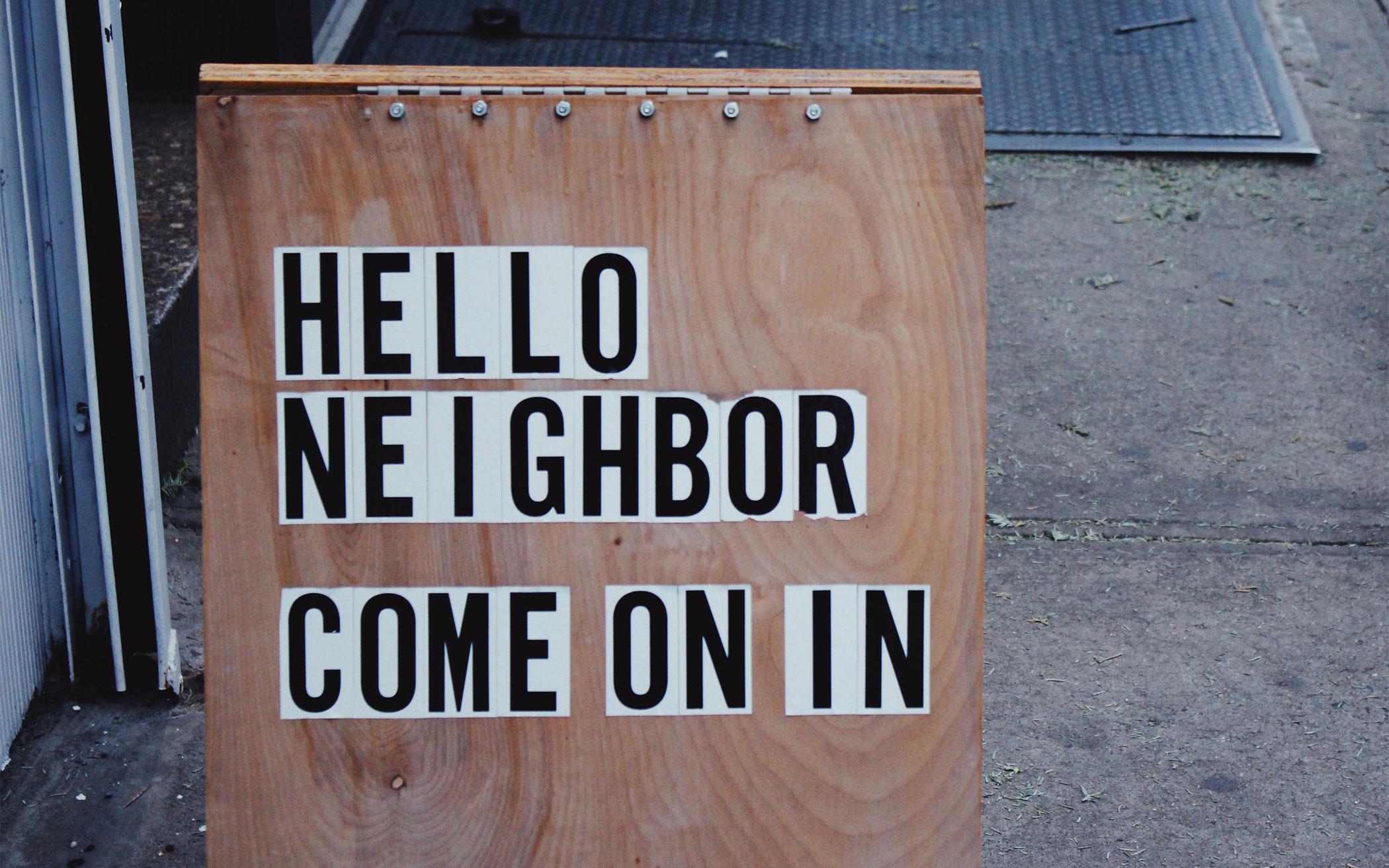“When they came to Jerusalem, they were welcomed by the church and the apostles and elders.” —Acts 15:4
“Here we go again,” I thought to myself. Sunday morning worship had just concluded at the church I was visiting recently with three of our teenagers. My spouse, a chaplain of discipleship at our local college, was filling the pulpit elsewhere, so we were on our own. As the couple hundred people in attendance gradually filtered out of the sanctuary into the fellowship hall, I filled my coffee cup, grabbed a cookie, and positioned myself with my girls in a fairly prominent spot in the middle of the room. The room was soon abuzz with the hum of conversation as the regulars easily mixed and gathered in small circles. But none of it involved us. One or two people gave us a tentative smile or nod as they walked by, but they kept moving. After 10 or 15 minutes, we eased out of the building, having met precisely zero people.
As a kid growing up in a Methodist church in small-town northern Minnesota, I distinctly recall my mom inevitably making a beeline to any visitor to our church to engage them in conversation before they could make it to the exit. Years later, the little church that became my spiritual lifeline through the challenging years of law school and an unhappy law practice was so because of the lunch invitation extended to me by a young professional couple following my first Sunday visit to that church. As an introvert who craves in-depth spiritual friendship, I can witness to the fact that every meaningful relationship with church in my long adult life has been rooted in an almost immediate and palpable sense of that church’s enthusiastic embrace of my being among them.
But more recently, I’ve encountered something different. Since my spouse traded in her pastorate of a small, local church for a campus ministries position several years ago, our family search for a church home has taken us to more than a few area congregations. In the course of our wanderings, we have heard thoughtful, challenging, scripturally anchored preaching and participated in rich and varied styles of worship. But among the most notable phenomena we have encountered across those churches we visited was a conspicuous absence of hospitality. Certainly not always. We have met plenty of folks whose warm welcome has been a balm as we struggle to find a more permanent church home for our family. But more often than not we would find ourselves on the drive home commenting on how few people truly engaged us in conversation or extended to us much more than a perfunctory greeting. I love church. I love the church. But this too-common experience has left me wondering if the church, in fact, loves me.
I have wondered if it was just me, if I am the one to blame. As an introvert, lingering in the foyer surrounded by strangers can for me be excruciating. I’ve wondered if I give off a vibe. I know the corners of my mouth naturally turn down rather than up. Perhaps I have been subconsciously emitting signals that I want to be left alone. But I don’t go to church by myself. How then to explain my wife’s comparable experience? While hardly objective, I assure you that anyone who meets my beloved would have to concede that she is utterly delightful—outgoing and vivacious, curious about others, charming and inviting in her manner. We typically are accompanied by a gaggle of children who are (relatively) fresh-scrubbed and have been drilled by their parents to put on a happy face. I wonder about a church of people who are not drawn to my wife and kids on first encounter.
I fear that I am likely to come across here as rather judgmental. I realize it isn’t easy striking up a conversation with complete strangers. In today’s age, it isn’t unreasonable to conclude that the visitor might not wish to talk, that they would even prefer to be left alone and to escape the building unscathed. Nevertheless, I feel compelled to raise the subject of hospitality as what has been for me a simmering resentment is hardening into something closer to a bitterness toward Christ’s church.
Fair or not, how I am received on a Sunday morning by the people in the pews has become something of a default measure of that church’s spiritual health. Even if that is uncharitable on my part, the question still merits attention. If I am feeling this way, what about the unchurched person who has finally screwed up the courage to enter a house of worship? What are they likely to conclude about Christians and the church? I simply don’t know how we can effectively share the good news of Christ and the gospel if we can’t even welcome the stranger into our church family as we gather in the very presence of God. So let me offer a layperson’s ill-formed thoughts that might spark a broader discussion on the importance of hospitality to the outsider.
Why is it so important to greet the stranger in our midst? I don’t know if we really need to ask this question. But let’s be sure we understand why our welcoming of the stranger matters.
First, because we are commanded to. Scripture is clear. Romans 12:13 exhorts us to “extend hospitality to the stranger” (NRSVA). Or, as Jesus rhetorically asked in Matthew 5:47, “And if you greet only your own people, what are you doing more than others?”
Second, because we might actually be in the presence of Christ himself or his angels. In the famous passage of Matthew 25:35, Christ reveals that when his followers invited the stranger in, they were in fact doing it to him. Similarly, in Hebrews 13:1-3, we are warned not to neglect showing hospitality to strangers lest we be entertaining angels unawares. Who is it we are ignoring on Sunday morning when we overlook the visitor?
Third, because it is among the ways we demonstrate love for our neighbor. In Matthew 25, Jesus puts inviting in the stranger on par with feeding the hungry and giving a drink to the thirsty, clothing those who need it, caring for the sick, and visiting the prisoner.
Fourth, because it is one more way in which we glorify God. In Romans 15:7, we “welcome one another as Christ has welcomed you, for the glory of God” (ESV).
In view of these clear scriptural imperatives, let me raise a few practical questions for the church.
How do we cultivate the habit of hospitality? It would be nice if we didn’t have to think about this, if we could simply count on the church to organically extend hospitality to the visitor. Perhaps it is one more casualty of the ubiquity of the smartphone, but I fear the practice of making conversation with someone we don’t know is something of a lost art. As someone who has spent a lifetime working to overcome his Scandinavian reserve, I can attest to the discomfort that often accompanies that initial encounter with a guest or visitor. It strikes me that a church that is intentional about being welcoming to the stranger should be intentional first about reminding the congregants to keep an eye out for the visitor and second about providing the occasional workshop or set of pointers on how to go about naturally extending that welcome.
Is Sunday post-worship fellowship hour the primary focus of your congregation’s cultivation of community? I have always cherished the time of fellowship that comes on the heels of Sunday morning worship. It is when I get to hear the latest from my besties, check in with the senior saints, touch base with those who might be on the fringes of our church family, and catch up with those I otherwise don’t normally see. That sweet time of fellowship can be when the church really feels the most like the church. So I get it when people ask when else they are supposed to connect with their Christian brothers and sisters. Isn’t this when we do the very important work of building up the body of believers in our local congregation?
But I wonder if too much emphasis on Sunday-morning socializing is really a subtle sign of too little fellowship at other times in the week. The midweek potluck, the Bible studies and reading clubs, the men’s and women’s and young adult groups, the co-ed softball teams—these are not mere vestiges of the traditional ways of doing church. They are where a genuine deeper Christian community is built beyond the few minutes of casual conversation that happen after worship. Might we not be freer to devote time on Sunday to extend a greeting to the stranger in our midst if our bonds of Christian friendship were being forged in stronger ways apart from the fellowship hour?
Is your church too big? I can hear the protestations already. How are we supposed to know when someone is visiting our church on a Sunday morning? At the risk of challenging the conventional mindset of judging a church’s health by its numbers, this one strikes me as straightforward. If the folks who belong to a church are unaware there is a stranger in their midst, then it probably means that the church is too large. (Discuss!)
Does this mean we still need those old-fashioned greeters in the back of church? Though this incident happened a number of years ago, I recall it as if it was yesterday: Our family had decided to visit the “it” church in town. The word on the street was that this was the place to be and to be seen. After worshiping there that Sunday morning, we could understand why. The music leadership was professional and Spirit-led; the preaching was excellent and insightful. It was an undeniably rich worship experience. Yet it was overshadowed by our not being seen when we walked in the door. Not a single person acknowledged our presence. No one offered even a simple “Hello.” Even though the church was packed, there was no one to slip us a bulletin, direct us to a place to sit, or otherwise offer assistance. We were left to fend for ourselves.
A couple of thoughts on greeters: Yes, we still need them. If we want someone to feel comfortable in our midst, they must be welcomed in. There is nothing quite like the invitation of a warm reception, a genuine smile, a firm (pre- or post-COVID) handshake. As at home, hospitality begins at the door. Moreover, the first point of contact with the stranger should be staffed by people who genuinely like people. A confession: Our family has a hard time getting to church on time (actually, we have trouble getting anywhere on time). Too often we find ourselves scurrying into church in the midst of a call to worship or during the reading of the announcements. But I have lost count of the times we’ve been met by the stern usher whose unspoken condemnation of our tardy ways makes me momentarily consider reversing my steps and heading back to the parking lot. Churches should be intentional about having greeters, about who to have as greeters, and about training them up in the art of hospitality.
The headlines on the church and religion aren’t good. Fewer and fewer people regularly attend. Affiliation with a faith tradition or denomination is plummeting as people opt for a spirituality of their own making. For those of us who believe that the church has something to offer the world, the idea of evangelizing is intimidating, even overwhelming. But let me suggest two simple steps that might be a good start: Let’s get back to inviting people to church. And when they come, let’s demonstrate Christ’s love of them through genuine hospitality.
Discussion Questions
- When was the last time you talked to a stranger or visitor at church? How was the experience?
- How does your local church practice hospitality, especially to visitors and newcomers?
- The author asks, “Is your church too big?” Is there an amount where church attendance gets too large for the church’s own good? Discuss.
- Have you ever experienced genuine heartwarming hospitality from fellow Christians? How did it happen? What can you draw from that experience in your own practice of hospitality?
About the Author
David Ryden teaches political science at Hope College in Holland, Mich. He writes on matters of religion and politics, with a special focus on religious liberty.









